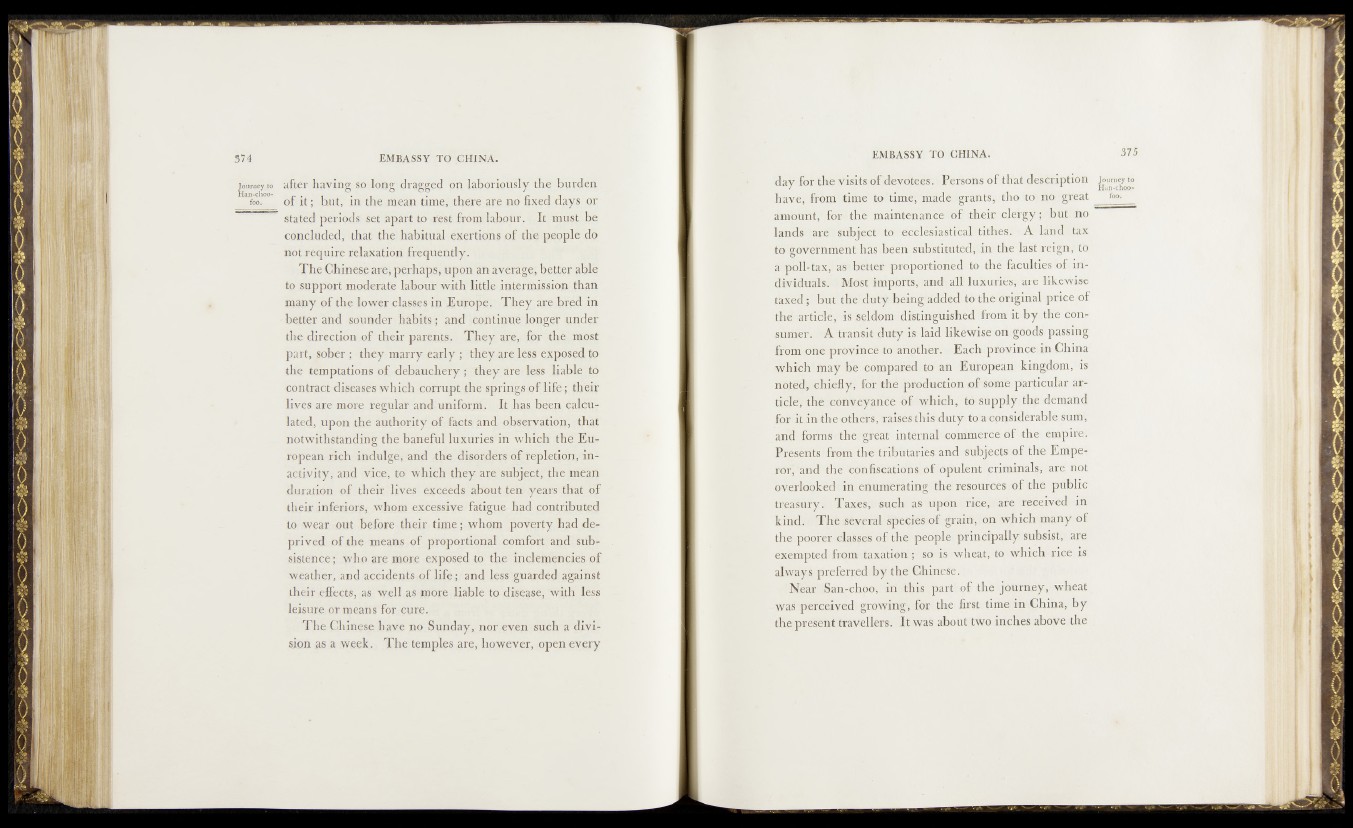
J&x&QieyJp after having, so- lo'ng dragged pn laboriously the burden
.feo, of it; hut, in the mean time, ,th£re_aro no fixed-Tbiys> Qr
stated: jbpod# set apart to rest from labour. It most be
ciinhwfod; that th e habitual exertions of the people do
nofrequirerelaxation frequently, ffjj
The Chinese ate, perhaps, upon an average^ better able
tp support moderate labour with' little intejrjpihision than
many of the lower classes in Europe. T h p y ^ e Jhrect in
better and sounder habits-; and -continue longer under
the direction of their parents,. They are,, for’ the naosjt
part, sober ; they marry early ; they^re less exposed to
the tempHatiops of dehanchery ; they are’ foss JiabfoSfp
ponferact diseases which porrupt the springsIb^lfife; thpir
lives are more regular and uniform. It has bfijen calculated,
upon the authority of facts-and observation, that
- notwithstanding the baneful luxuriesfiti which''ffi'e, E uropean
rich indulge-, and the disorders of repletionf^in-
activity, and vice, to which they are subfogt, the-,mean
duration of their lives exceeds about ten'-yearS'that of
their i n f e r i o r s , whom excessive fatigue had contributed
to -wear out before their time; whom poverty had deprived
of the means of proportional comfort and- s ^ r
sistepce; who are more exposed to the inclemeftcfes of
weather, apd jiccidents pf life; and lessguarded against
their effects, as well as more liable to disease, with less
leisure, or means for eure. |
The Chinese have no Sunday, nor even such a division
as a week. The temples are, however, opep every
ffa-fdfonthe Visits ofifevhteps. \ P&nsoms of1 thbMe$t$iption
hfeve; from time" pastime, ura^e^f^hts^.-tho; to> norgfeat f«g<
amount, the maintena^^ui^ifteir- olsfg$b butuno
Jjffids (are',’subjects’ifeo^^ebjsHfi’asti’^ai tithbi$§frA |fMd/''tax
to gbvemmlhhftap^tpn ■.substituted,!ini'1,the1; l a s t i h -
aaaHfchiarj? as better p r d l ib ^ ^ ^ ^ ^ lw f a c u lt ie s 'Bif^in-
dividuafef M<§s$im p o rts<and'- all 1 uxiiril||$ar e‘likewise
faxed tlfleJdftdy~b©fog’added; to;thgforigi n al psfoe^of
tbe’sarticle,' is Seldom dikiaarguisHefflfrom it by.the copr
sume&foA transit .duty is laid likewise orf^fSbdiSj
frp»^feproY'incevt0!hnpthers"i^E:aelk'lpr03sii®Qeiji®il,^|iina
which may be eompalmd to an European kingdom, is
nof^dtlb'hfeily, for the production o'Molmhi phrticjjfep^r-
tijje,-4he i.GQn&peygnPe ohij^M'sh, to- supply; thp'de$|$:n4'
for it in the others;%^3ses^h'ii'Mutplbfeepi}sid'firab‘J'0 sum,
and forms the^^ekigltennal comm'ereeiHfrthe empifte^
Presents'from the tributaries and^^&ctsiofdll© limpet
rof^and the ^onfiseasidhs |i§idpulent c r im in a ls ^ ^ |i^ .'
overlooked, in enumerating fhd resdurees t'Qf th|l|§u$blic'
treasury.'. Taxes,;-sueh as upon ■ rfoeiftaie' received, ?i;ft
kind. The several ^eejes;t©f grainy Son: Wjhich many . of
theipoofer classes1^ thej'people: principally subsists are
exempted from- taxation; -:$yffk;wheafe, to whieh rice is
always preferredhy the-Chines^.-:fo
Near San-ehpOjiiri dhis partial .the journey,- wheat
was perceived growing, for thp first time imChina, by
the presenbtravellers. It was abotfot^o inches above the .